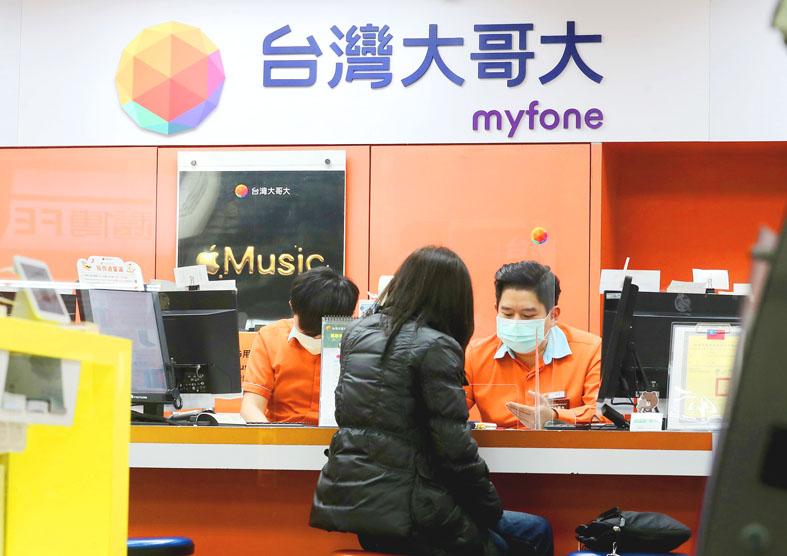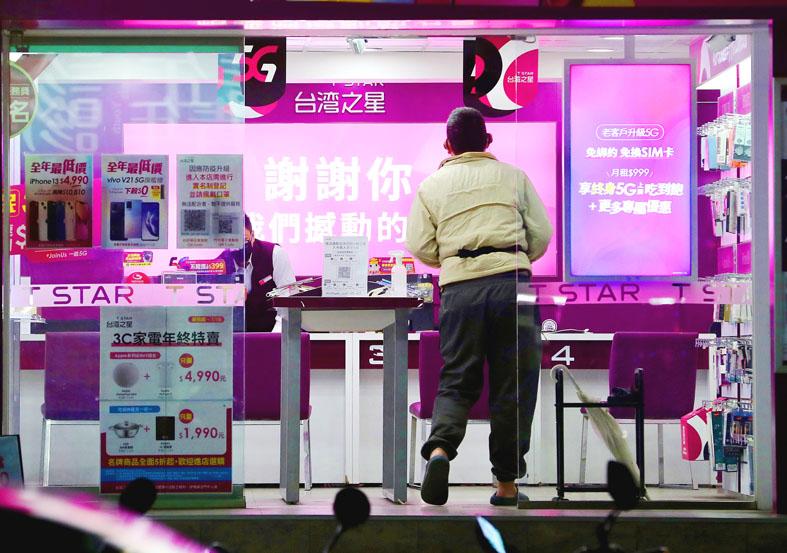Taiwan Mobile Co (台灣大哥大), the nation’s second-largest telecom, yesterday said it would acquire Taiwan Star Telecom Corp (台灣之星), the nation’s fourth-largest carrier, as the company aims to expand its customer base, and boost efficiency and competitiveness in the local market.
Taiwan Mobile aims to enlarge its spectrum of resources for greater economies of scale, the telecom said.
It also looks to achieve earnings and net-worth growth, as well as better customer satisfaction, the company said.

Photo: CNA
Taiwan Mobile, which had 7.11 million users as of the end of September, and Taiwan Star, which had 2.65 million users, would have a combined customer base of 9.76 million, the companies told a news conference in Taipei yesterday.
That would be higher than the 9.12 million users Far EasTone Telecommunications Co (遠傳電信) and Asia Pacific Telecom Co (亞太電信) have through a business partnership, the firms said.
Its combined customer base would come close to the 10.65 million users of Chunghwa Telecom Co (中華電信), the nation’s largest telecom, they said.

Photo: CNA
Taiwan Mobile said it is planning to issue 282.222 million new common shares that would be given to Taiwan Star shareholders in exchange for their shares.
The exchange ratio would be one Taiwan Star share for 0.04508 of its own shares, Taiwan Mobile said, adding that its calculations were based on Taiwan Star’s stock price as of June 30, expected merger synergies and comparable companies’ price-to-book ratios.
Taiwan Star would be dissolved after the merger, the companies said.
The deal is subject to approvals from a Taiwan Star shareholders’ meeting and regulatory authorities, they said.
The firms aim to complete the deal by Sept. 30 next year, but no later than Dec. 31, with the option of extensions if both parties agree, they said.
With the addition of Taiwan Star’s 5G licenses, Taiwan Mobile would own 100 megahertz of the 3.5 gigahertz frequency band, which would help speed up its promotion of 5G services to corporate clients, Taiwan Mobile president Jamie Lin (林之晨) said.
After the merger, Taiwan Mobile would terminate its 3G network and thousands of 4G base stations to avoid overlapping resources, which would help save significant amounts of energy, Lin said.
Taiwan Mobile would respect all contracts customers signed with Taiwan Star and hopes to gain support from regulators, he said.

POWERING UP: PSUs for AI servers made up about 50% of Delta’s total server PSU revenue during the first three quarters of last year, the company said Power supply and electronic components maker Delta Electronics Inc (台達電) reported record-high revenue of NT$161.61 billion (US$5.11 billion) for last quarter and said it remains positive about this quarter. Last quarter’s figure was up 7.6 percent from the previous quarter and 41.51 percent higher than a year earlier, and largely in line with Yuanta Securities Investment Consulting Co’s (元大投顧) forecast of NT$160 billion. Delta’s annual revenue last year rose 31.76 percent year-on-year to NT$554.89 billion, also a record high for the company. Its strong performance reflected continued demand for high-performance power solutions and advanced liquid-cooling products used in artificial intelligence (AI) data centers,

SIZE MATTERS: TSMC started phasing out 8-inch wafer production last year, while Samsung is more aggressively retiring 8-inch capacity, TrendForce said Chipmakers are expected to raise prices of 8-inch wafers by up to 20 percent this year on concern over supply constraints as major contract chipmakers Taiwan Semiconductor Manufacturing Co (TSMC, 台積電) and Samsung Electronics Co gradually retire less advanced wafer capacity, TrendForce Corp (集邦科技) said yesterday. It is the first significant across-the-board price hike since a global semiconductor correction in 2023, the Taipei-based market researcher said in a report. Global 8-inch wafer capacity slid 0.3 percent year-on-year last year, although 8-inch wafer prices still hovered at relatively stable levels throughout the year, TrendForce said. The downward trend is expected to continue this year,

Vincent Wei led fellow Singaporean farmers around an empty Malaysian plot, laying out plans for a greenhouse and rows of leafy vegetables. What he pitched was not just space for crops, but a lifeline for growers struggling to make ends meet in a city-state with high prices and little vacant land. The future agriculture hub is part of a joint special economic zone launched last year by the two neighbors, expected to cost US$123 million and produce 10,000 tonnes of fresh produce annually. It is attracting Singaporean farmers with promises of cheaper land, labor and energy just over the border.

A proposed billionaires’ tax in California has ignited a political uproar in Silicon Valley, with tech titans threatening to leave the state while California Governor Gavin Newsom of the Democratic Party maneuvers to defeat a levy that he fears would lead to an exodus of wealth. A technology mecca, California has more billionaires than any other US state — a few hundred, by some estimates. About half its personal income tax revenue, a financial backbone in the nearly US$350 billion budget, comes from the top 1 percent of earners. A large healthcare union is attempting to place a proposal before